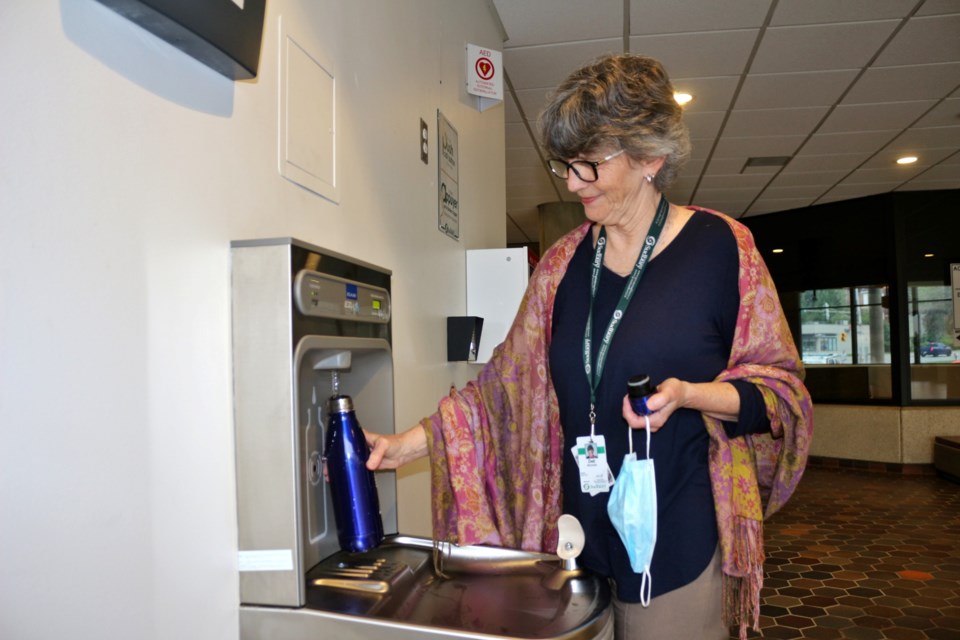In five years’ time, water sold in single-use plastic bottles will no longer be an option at city-owned facilities throughout Greater Sudbury.
During this morning’s operations committee meeting, members unanimously greenlit an effort to prohibit their sale in municipal facilities by Dec. 31, 2027, which chair/Ward 9 Coun. Deb McIntosh described as another step toward environmental stewardship.
“I think a lot of people don’t realize that it is fossil fuels that go into the making of the plastics, and that’s why it’s important we think about single-use plastics,” she told Sudbury.com after the meeting.
“We’ve declared a climate change emergency in Greater Sudbury, and this is just one more step we can take.”
Further, she added, “We clean the water for you to drink and it comes out of the tap for free, so why would you pay for it in a bottle?”
A case of 24 bottles of water can be purchased at Walmart for $1.97. However, 1,992 bottles can be filled with municipal tap water for the same price, according to a report by city administration.
Accompanying the shift away from plastic water bottles by Dec. 31, 2027, will be the installation of 132 water refill stations at locations throughout the municipality where water fountains currently exist. These new stations include an attachment to fill reusable water bottles.
Water refill stations already exist at Tom Davies Square, the downtown transit station, airport and some other locations, and replacing the remaining 132 water fountains will carry a cost of approximately $1 million over the next five years.
“There are some issues with the installation requirements, so it’s difficult to get an exact pricing for installation because it depends on what the existing infrastructure already is,” environmental services director Renee Brownlee told the committee.
The price tag drew the attention of both Ward 4 Coun. Geoff McCausland and Ward 1 Coun. Mark Signoretti during today’s meeting, but Brownlee assured them the city would seek funding from senior levels of government.
The city’s shift from single-use plastic water bottles in municipal facilities is in keeping with the Community Energy and Emissions Plan the city adopted after council unanimously declared a climate emergency in 2019.
While the “3Rs” includes “reduce, reuse and recycle,” McIntosh clarified it also represents a hierarchy of importance.
“Reduction of waste must always come first and foremost, followed by the reuse of materials, and, as a final resort, recycling of waste into new products,” according to the municipal report voted on today.
“On average, city staff and volunteer groups collect over 31 tonnes of litter every year along city roads and on city properties. A significant proportion of this litter is single-use plastics. Reducing the consumption of water in single-use plastic bottles will contribute to less litter in our community.”
Water refill stations are free to use, which the city’s report cites as another benefit to the community, and more than 300 refillable water bottles have been distributed to the city’s homeless and vulnerable populations.
Potential disadvantages to the shift from selling water in single-use plastic bottles, according to the municipal report, is that people might instead purchase sugary beverages from machines. This may be mitigated by the sale of reusable water bottles in their place alongside the installation of water refill stations.
During today’s meeting, Ward 11 Coun. Bill Leduc raised concerns regarding the availability of recycling bins at municipal facilities, to which Brownlee clarified it is a municipal responsibility. The city also steps up, when requested, to supply additional recycling facilities for major events.
To request recycling facilities or to complain about their lack of availability, she said people should phone the city’s customer service line at 311.
Another concern raised this morning had to do with the city’s Alcohol Risk Management Policy, which states “all drinks must be served in plastic or paper cups,” except in the case of formal functions such as weddings, banquets and business meetings.
Citing such major events such as Ribfest, Ward 4 Coun. Geoff McCausland said, “We’re requiring them to use thousands of plastic cups every summer,” referring to this section of the bylaw as “outdated.”
McCausland pledged to bring a motion forward during a future meeting to update this bylaw.
Although this morning’s operation’s committee decision to do away with the sale of water in single-use plastic bottles within five years still needs to be ratified by city council as a whole, the committee’s unanimous support points to a likelihood it will be adopted.
Tyler Clarke covers city hall and political affairs for Sudbury.com.
